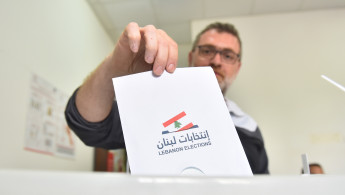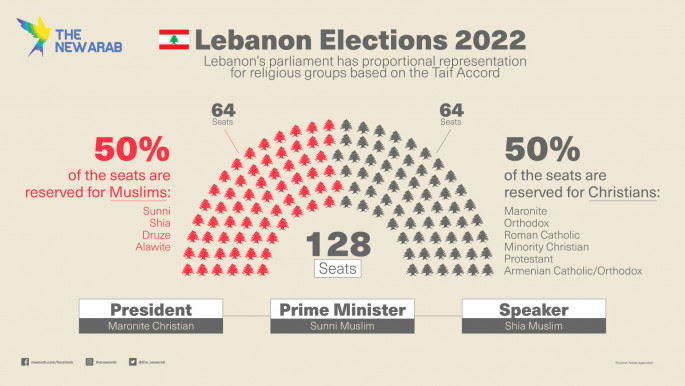Lebanon election explainer: Who are the key players and what happens next?
Welcome to The New Arab's coverage of Lebanon's General Election 2022 held on May 15, 2022. Follow live updates, results, analyses, and opinion in our special hub here.
Lebanon went to the polls on Sunday in its first parliamentary election since the country sunk into economic collapse and was hit by the devastating 2020 Beirut Port blast.
The political landscape in Lebanon can be confusing, especially for those unfamiliar with the complex political system of the country. Votes are currently being counted and the final results of the election are due later this week.
Lebanon has an extremely diverse political landscape, with dozens of political parties mostly divided along sectarian lines and influenced by outside powers.
Broadly speaking, the main sects are Sunni Muslims, Shia Muslims, Maronite Christians, Orthodox Christians, and the Druze. They have been granted a specific number of seats in parliament by convention.
Lebanon has a proportional representation system - an electoral system in which the distribution of seats corresponds closely with the proportion of the total votes cast for each party.
The issues this year:
There are two main issues that have dominated the political scene leading up to the 2022 election.
The first is the issue of Hezbollah, a political party that has disproportionate power due to its military wing, which allows it to operate effectively as a state within a state. The parties of the political establishment are divided between those supporting and opposing Hezbollah.
Anti-establishment anger is another dominant issue. Many Lebanese, regardless of political views of religious background, are disillusioned with the political elite. They see them as a corrupt class who have bankrupted the state and want to see them removed from power.
The 'establishment' does not only include the parties that have been in power since the last election but also 'opposition' groups that have served as part of Lebanon's political system for the last three decades. Some of them are former warlords from the civil war era.
Independent parties and candidates hope to take advantage of popular anger and win seats with fresh faces in parliament.
Who’s competing?
The establishment parties are essentially divided into two blocs and include parties across the religious spectrum. One bloc supports Hezbollah, and the other doesn't.
All the parties belong to the political elite.
Pro-Hezbollah bloc:
Broadly speaking, the pro-Hezbollah bloc is influenced by Iran and is known for its support for the Syrian regime of Bashar al-Assad. This group had a majority in parliament, but it appears to have lost a lot of support during this election.
This bloc includes:
Hezbollah - A Shia-led political party that has its own military wing that has fought in Syria for the Assad regime and is backed by Iran. It is led by the Shia cleric Hassan Nasrallah.
Amal
Syrian Social Nationalist Party
Lebanese Democratic Party
Ba'ath Party
Anti-Hezbollah bloc:
These parties oppose the influence of Hezbollah, are against the Syrian regime, and lean toward the West and Saudi Arabia.
This bloc includes:
Future Movement - This was the biggest Sunni party opposing Hezbollah and boycotted the elections after its leader and former Prime Minister Saad Hariri stepped away from politics in January this year. This has led to a major political vacuum which has allowed the Lebanese Forces and independent candidates to gain seats.
Lebanese Forces - a Christian party led by former warlord Samir Geagea that is projected to make major gains in these elections.
Progressive Socialist Party
National Liberal Party/Ahrar
Independents:
The independents are united around only one issue - they are against the ruling establishment and all of the parties listed above.
They do not belong to any larger political coalition and range from centre-right to centre-left. If elected, they will be the new faces in parliament.
The independents have been helped by Lebanon's move toward a proportional representation system in 2018 which has allowed smaller parties or individuals on shoestring budgets to gain more seats in parliament.
What happens next?
Once the results are in, the elected officials must form a government. Preliminary signs show that no bloc will gain a complete majority and Lebanon could be heading towards a hung parliament, which could lead to protracted negotiations on the formation of a new government that will likely take months.
The next major vote is the presidential election in October 2022, when the parliament elects the country's next leader. A hung parliament does not bode well for this, as the various parties might not be able to agree on a single figure to elect as president.
This has been a problem in the past, when Hezbollah's MPs refused to enter the parliamentary chamber to elect a president until they knew they had secured enough support for their chosen candidate. This resulted in Lebanon being without a president for two years - from May 2014 to October 2016.







 Follow the Middle East's top stories in English at The New Arab on Google News
Follow the Middle East's top stories in English at The New Arab on Google News
![Both Hamas and the Palestinian Authority welcomed the ICC arrest warrants [Getty]](/sites/default/files/styles/image_330x185/public/2024-11/GettyImages-2178351173.jpg?h=199d8c1f&itok=TV858iVg)

